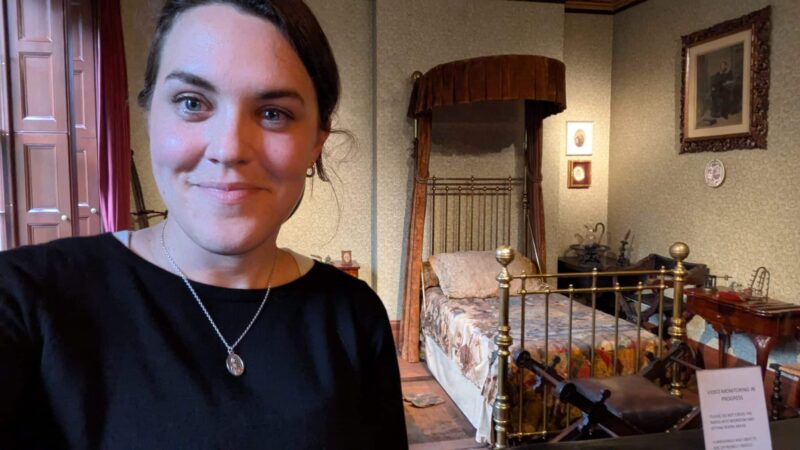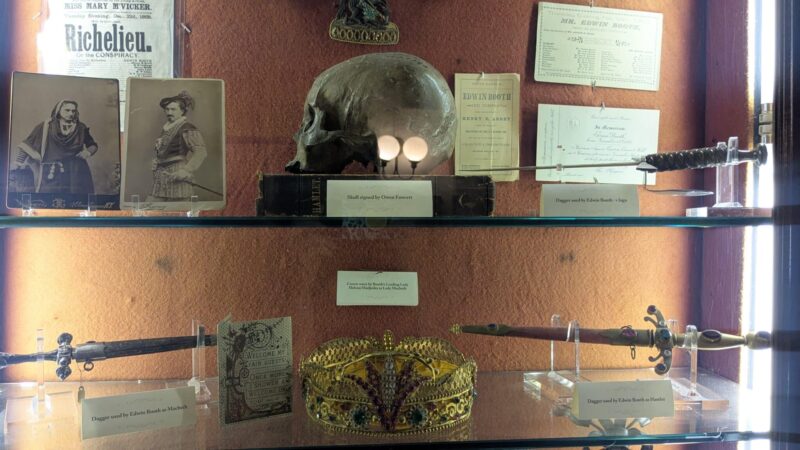Edwin Booth & American Grief: An Interview with Elizabeth Reese
Tragedy is frequently a family affair. Madness can be generational, trickling down the family tree and affecting individuals in similar ways. In the Booth family of thespians, the 19th Century stage became integral in how they lived their lives and how their tales are still told today. Elizabeth Reese, a Washington, D.C.-based historian of grief and public memory, researches the complicated family ties of the Booth brothers: Junius Jr., Edwin, and John. Overshadowed by youngest brother John’s assassination of Abraham Lincoln, Edwin persevered through the aftermath – balancing condemnation of John’s actions while honoring his memory. “I believe all Booths are more or less eccentric,” Edwin once wrote, embracing his own theatrical career as the Booth name became tarnished and stained by Lincoln’s death.

What made you interested in researching Edwin Booth?
Reese: “For a bit of background, my undergraduate degree was in theatre and I grew up outside of Baltimore, so a family of actors from Baltimore was immediately intriguing to me. Despite living so close to Washington, D.C., I didn’t visit Ford’s Theater until my senior year of high school but that first visit gripped me. I remember looking up at the presidential box and wondering what it must have been like for those in the audience to witness that terrible moment. Initially, it was John Wilkes Booth and what would motivate someone to carry out an act so terrible that interested me, but as I went down the Booth family rabbit hole, Edwin stood out.”
“Edwin was such a stark contrast against his brother. He was arguably more talented and successful and continued to perform even after the assassination, a moment that could have ended his career. That perseverance made me wonder: how did the tragedy shape him? What did it mean to carry his family name, and still be regarded as the greatest Shakespearean actor America has ever produced? As I dug deeper, my focus shifted. I became less interested in the shadow cast by his brother’s crime, and more captivated by Edwin himself, his motivations, his burdens, and the quiet, resilient melancholy that defined his career.”
Did Edwin hold the same political views as his brother John?
Reese: “Edwin was not an actively political person but he was certainly a Unionist. He was in London when his daughter was born and insisted that an American flag hang above his wife’s bed so that their child would be born under the stars and stripes. In November 1864, he wrote to his friend Emma Cary proudly admitting that he cast his first vote ever in the presidential election saying that ‘I suppose I am now an American citizen all over, as I have ever been in heart.’ His vote was for Lincoln.”
“We do know that the two of them extensively quarreled over John’s political views. In 1863-1864, when John often stayed with Edwin in New York, family and friends reported the two would have rather heated arguments over their differing political views, with one so intense it ended with Edwin kicking John out of his house.”
How did Edwin react to Lincoln’s assassination?
Reese: “Edwin was performing the role of Sir Edward Mortimer in The Iron Chest in Boston on the evening of April 14, 1865. Accounts vary on when he actually learned the news, whether it was post-performance later that night or early the next morning, but his immediate response was to retire from acting indefinitely. Before his brother was even captured, Edwin published a public apology to the nation condemning the crime. Privately though, Edwin worked tirelessly to retrieve his brother’s remains to have them secretly buried at the family plot in Baltimore. Eventually, Edwin returned to the stage. To friends, he wrote that he would have preferred to leave the profession altogether but the financial future of his daughter depended on his work.”

What do you wish the public understood more about the relationship between Edwin and John?
Reese: “I think there is a misconception that the two brothers hated each other, but their relationship was more complicated than that. Like many siblings, the two brothers had their share of rivalry and disagreements, but there was also a deep bond between them that is often overlooked. John was the only member of the Booth family to attend Edwin’s wedding to Mary Devlin, and he was present at her funeral, as well. They supported each other’s careers, attended each other’s performances, and even shared the stage in a production of Julius Caesar alongside their older brother Junius, with John as Marc Antony and Edwin as Brutus.”
“After the assassination, Edwin publicly distanced himself from John, understandably so, but privately, the connection wasn’t so easy to sever. He kept a photograph of John next to his bed, one of the last things he saw at night and the first thing he saw in the morning. I think, as John’s older brother, Edwin carried a great deal of sorrow and possibly guilt over what happened.”
“This unique grief was one that could never be spoken, but I recently discovered a letter that Edwin received in late April 1865 from a friend that said: ‘But what days of anguish must these be for you, while one so near to you in hunted throughout the land. Your disapproval of the act makes the agent no less dear to you. He is flesh of your flesh, and blood of your blood. I am sure that you would willingly die an honorable death to save him from a dishonored one. But he is where you cannot help him.’ This letter, and the fact that Edwin did not dispose of it, indicates to me that this grief he carried was a deeply private one and it must have been comforting to see that grief recognized.”
How could more attention on Edwin help us better understand American history? What topics could his story contribute to?
Reese: “Edwin provides a compelling case study in the rise of American celebrity culture. As one of the first truly national theatrical stars, Edwin helped shape how fame operated in the nineteenth century, particularly before the age of film or mass media. His career reveals how theatre functioned not just as entertainment, but as a central part of American cultural and political life, especially during the Civil War era.”
“His story also speaks to the complex intersection of art and national trauma. Despite being the brother of President Lincoln’s assassin, he remained a celebrated figure, raising important questions about public memory, forgiveness, and the separation (or entanglement) of personal identity and political history.”
“Perhaps obviously, the Booth family reflects how deep political divisions can fracture even the most intimate bonds. While John Wilkes Booth acted on his Confederate sympathies with violence, Edwin remained loyal to the Union—embodying the kind of family tensions that defined the Civil War era. These dynamics still resonate today and hold up a mirror from the past to our current lives.”
Interested in learning more? Elizabeth will be presenting her research on Edwin Booth on November 15, 2025 at the Lee-Fendall House Museum in Alexandria, VA and on January 23, 2026 at the Folger Shakespeare Library in Washington, D.C. If your organization or group would like to schedule this lecture, please visit www.elizabethmreese.com to contact Elizabeth.
Elizabeth M. Reese is a historian in the Washington, D.C. area whose research is focused on public memory, family ties, and grief. Elizabeth has spent over a decade as an interpreter at historic sites, developing tours and programs at Hamilton Grange National Memorial and the United States Capitol Visitor Center. Her work has been published in TIME, the Journal of the American Revolution, the New York Times, and can be seen on C-SPAN. Elizabeth was awarded the Scott Hartwig Public History Fellowship at the Civil War Institute in 2015 and the America 250! Commendation Medal in 2024. Elizabeth is currently the Senior Manager of Public Programs & Interpretation at Woodlawn & Pope-Leighey House and is completing her Master of Arts in American History from Gettysburg College. Her first book, Marquis de Lafayette Returns: A Tour of America’s National Capital Region, was published by The History Press (imprint of Arcadia Publishing) in 2024. She is currently working on a manuscript exploring how Edwin Booth’s grief transformed American theatre and contributed to national healing post-Lincoln assassination.
Madeline Feierstein is an Alexandria, VA historian specializing in psychiatric institutions, hospitals, and prisons. A native of Washington, D.C., her work has been showcased across the Capital Region. Madeline leads efforts to document the sick, injured, and imprisoned soldiers that passed through Civil War Alexandria. Additionally, she supports the National Museum of Civil War Medicine and interprets the burials in Alexandria’s historically rich cemeteries with Gravestone Stories. Madeline holds a Bachelor of Science in Criminology from George Mason University and a Master’s in American History from Southern New Hampshire University. Explore her research at www.madelinefeierstein.com.
This was fascinating, thank you!
This profound article is proof that many deeply moving untold stories exist. Thanks for bring this facet to readers!
Thank you for this insightful article. I didn’t realize John was the only family member who attended Edwin’s first wedding. I wonder why no one else from the family did. In addition to the complexity of his grief over John assassinating Lincoln, which is exemplified by the fact that he apologizes to the nation for his brother’s actions. However, he was also grieving the loss of his wife, so grief was “piled” on Edwin from multiple directions. Certain grief stories of the Victorian Era remain untold due to the strict social dictums surrounding grief and the strict notions of masculinity at the time.
Well their sister Asia didn’t like Mary Devlin so that was her reason. As for the other family members I’m not sure. Maybe the same feeling?
Hi Jess, thank you for your response. Based on my limited research into Mrs. Edwin Booth, she seemed to be a wonderful woman. However, Asia, who, due to her brother John’s influence, was a Confederate sympathizer, probably didn’t like that Mary was a New Yorker. I can’t really think of another reason Asia would’ve objected to her brother’s choice of bride, besides possibly personal spite.
Hi Dora! Thank you so much for your kind comments. As Jess mentioned, Asia Booth strongly detested Edwin’s wife, Mary Devlin. It’s not entirely clear why other family members did not attend the wedding, but their mother Mary Ann and youngest brother Joe, briefly visited the honeymooning couple in Niagra Falls the next month. A few years later, Mary Ann (along with John) attended Mary’s burial and the eldest brother, June, wrote about visiting Mary’s grave while in Boston in 1864. While the other family members did not have the same distate of Mary Devlin that Asia did (who wrote to a friend that she hoped her new sister-in-law would drown in a whirlpool), one could chalk it their absence to the fact that Edwin was perhaps the most emotionally distant of the Booth brothers as he once wrote that as a youth he was never the favorite because the “other children were more vivacious.” His deep grief and melancholy was present even in his younger years.
John’s presence at Edwin’s wedding does provide useful insight into the brother’s relationship; it was not all infighting and rivalry as is more commonly thought.